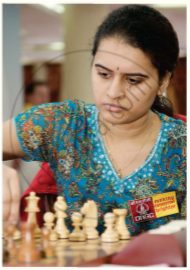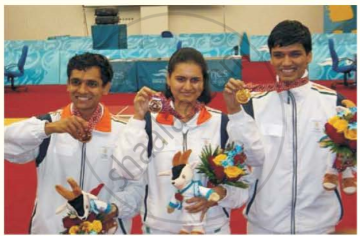Advertisements
Advertisements
Question
Some are Purple and gold flecked grey
For she who has journeyed through life midway,
Whose hands have cherished , whose love has blest,
And cradled fair sons on her faithful breast,
And serves her household in fruitful pride,
And worship the gods at her husband's side.
Read the lines given above and answer the question that follow:
Explain:
And cradled fair sons on her faithful breast,
And serves her household in fruitful pride,
And worships the gods at her husband’s side.
Solution
These lines are referring to the woman who has now seen life as a girl and bride and now is middle-aged. The imagery here shows that she has borne sons and nourished and cradled them close to her breast. It denotes that she has diligently performed her duties as a mother.
APPEARS IN
RELATED QUESTIONS
Read the English folktale given below and fill up the blank spaces with suitable words.
There were once three tortoises – a father, a mother (a) ________. a baby (b) ________ one fine morning during Spring, they decided (c) ________ picnic. They picked the place (d) ________ they would go; a nice wood at some distance, (e) ________ they began to put their things together. They got tins of cheese, vegetables, meat and fruit preserves. In about three months, they were ready. They set out carrying their baskets (f) ________ eighteen months, they sat down for a rest. They knew (g) ________ they were already half way to the picnic place.
In three years they reached there. They unpacked (h) ________ spread out the canned food. Then, mother began to search inside the basket. She turned it upside down and shook it (i) ________ something important was missing.
“We’ve forgotten the tin-opener. Baby, you’ll have to go back. We can’t start without a tin-opener. We’ll wait for you”. .
“Do you promise (j) ________ you won’t touch a thing (k) ________ I come back?”
“Yes, we promise faithfully,” Mother and father said together.
Soon after, he was lost among the bushes.
So, they waited and waited. A year went by and they were getting hungry. They had promised (l) ________ they waited. They began to feel really hungry (m) ________ the sixth year was about to end.
Mother tortoise said, “He’d never know the difference.” “No,” said the father tortoise.
Mother tortoise said, “He ought to be back by now. Let’s just have one sandwich (n) ________ we are waiting.”
They picked up the sandwiches, (o) ________ as they were going to eat them, a little voice said, “Aha! I knew you’d cheat! It’s a good thing I didn’t start for that tin opener,” baby Tortoise said.
Avik, a correspondent for his school magazine, interviews Grandmaster Koneru Bumpy. Let us read :
INTERVIEW WITH KONERU BUMPY
Avik : Good morning, Ma'am! Congratulations on your achievements in the World Grand Prix Women's Chess Championship in Istanbul recently!

Koneru Humpy : Thank you! This is my biggest win in the women's circuit. This is very significant, considering that it has come in an event which had three former world champions.
Avik : Indeed! Please tell us something about yourself, Ma' am!
Koneru Humpy : I was born in Gudivada, near Vijaywada, in Andhra Pradesh on March 31, 1987. I was originally named 'Humpi' {which means champion) by my father Mr Koneru Ashok, who later changed the spelling to Humpy, to give the nrune a Russian flavour. I write my family name , Koneru, before my given name, as is the convention with the Telugu speaking people. I started playing chess when I was 5 years old.
Avik : Who introduced you to the game?
Koneru Humpy : My father acquainted me with the game. He is also my first coach. I first showed interest at the age of 6 years, when I watched him play a game and suggested a move. Indeed it was the move that actually got me into the game.
Avik : Your father left his teaching profession to make you a champion !
Koneru Bumpy : Yes, when I took the 4th place in the Indian Under 8 Championship in 1995, he decided to leave his career and dedicate his time to me.
Avik : And you had won four World Championship at a very early stage.
Koneru Bumpy : Yes, the World Girl Under 10, the World Girls Under 12, the World Girls Under 14 and World Girls Junior Chrunpionships. I acquired my IM title in 1999 and in May 2002, I achieved my 3rd GM Norms in Elekes Memorial Grandmaster Tournrunent in Budapest.
Avik : You held the record from 2002 to 2008 for the youngest woman ever to become a grandmaster!
Koneru Bumpy : Yes, I achieved it at the age of 15 years, 1 month, 27 days, beating Judit Polgar's previous record by 3 months; which was later lost in the Women's World Chess Championship in 2008 to Hou Yifan. I won the World Junior Girls Chess Championship in 2001 and won the edition or North Urals Cup, the Women's Super Tournrunent held in Krasnoturinsk. In 2006, I participated in the Women's World Chess Chrunpionship, but my crunpaign had to end early in the second round. I played in the first board of Monte Carlo Chess Club and won the last two editions of the European Club Cup.
Avik : You have got some awards also !
Koneru Humpy : Yes, Arjuna Award in 2003, Padmashri Award in 2007 and Raja-Lakshmi Award in 2008.

Avik : In India, many young chess players are ready to take a break in education and are fully focussed on chess preparations. What are your views?
Koneru Humpy : I don't think that taking up chess as a career and completely neglecting studies will be necessary at an earlier stage. After getting to a certain level in the game, they themselves should decide their preferences i.e. whether to play seriously or not.
Avik : What advice would you offer to parents of enthusiastic and talented chess children?
Koneru Humpy : Parents should not compel children to play chess. If children are genuinely interested in the game, they should encourage them. But they shouldn't hurry to get results.

Avik : How often do you exercise? Do you think daily physical exercise can help a chess player to cope with the pressure and increase the brain's ability to concentrate?

Koneru Humpy : I spend around one hour per day on physical exercise. Exercise is a must for every chess player. As the proverb says, 'a sound mind in a sound body'. Exercise shows a lot of impact on the brain.
Avik : Thank you for talking to me and giving valuable advice.
Koneru Humpy : Thank you.
What are the 'present wants'? Who is its need of I~ 'present wants'? Why?
Read the extract given below and answer the questions that follow:
"Now tell us what it was all about"
Young Peterkin, he cries.
And little Willhelmines looks up
With wonder - waiting eyes,
"Now tell us all about the war,
And what they fought each other for".
- After Blenheim, Robert Southey
(i) Who are Peterkin and Wilhelmine? How does the poet describe the scene at the beginning of the poem?
(ii) What did Young Peterkin find and where? Describe it?
(iii) Who is referred to as "each other"? What did they fight for?
(iv) To whom are the words in the extract addressed? How was this person's family affected by the war?
(v) What, according to the poet, are the consequences that are often associated with great and famous victories? What message does the poet want to convey to the readers?
What questions did Golu ask the python?
What do you know about ‘That way?
What was it that made Prem leave his village?
To what use a mother puts the trees?
Who is the ‘he’ in the line "I couldn’t quite hear what he said" of the extract?
Write True or False against the following statement.
When Serbjit gets angry he shouts at people.
